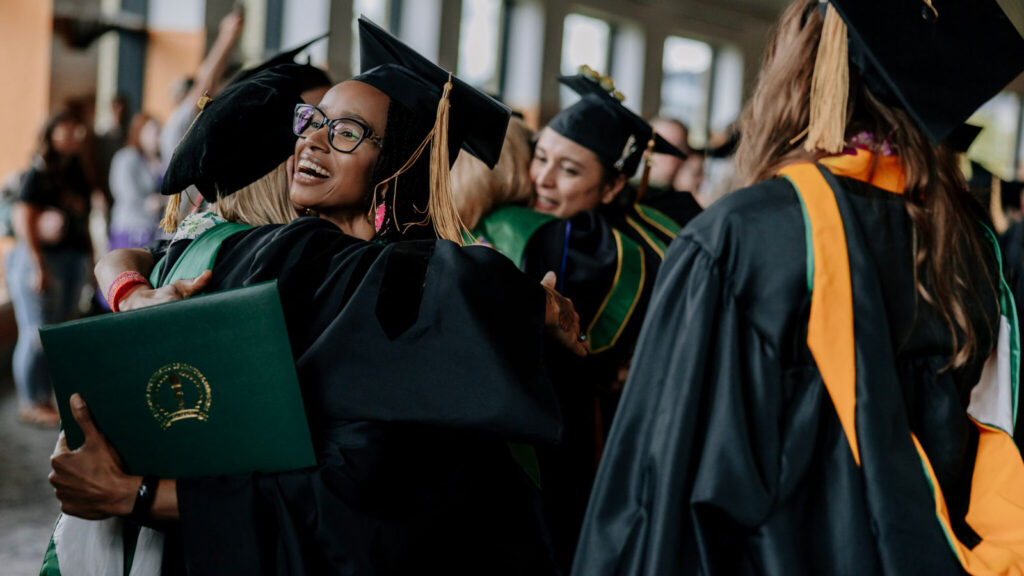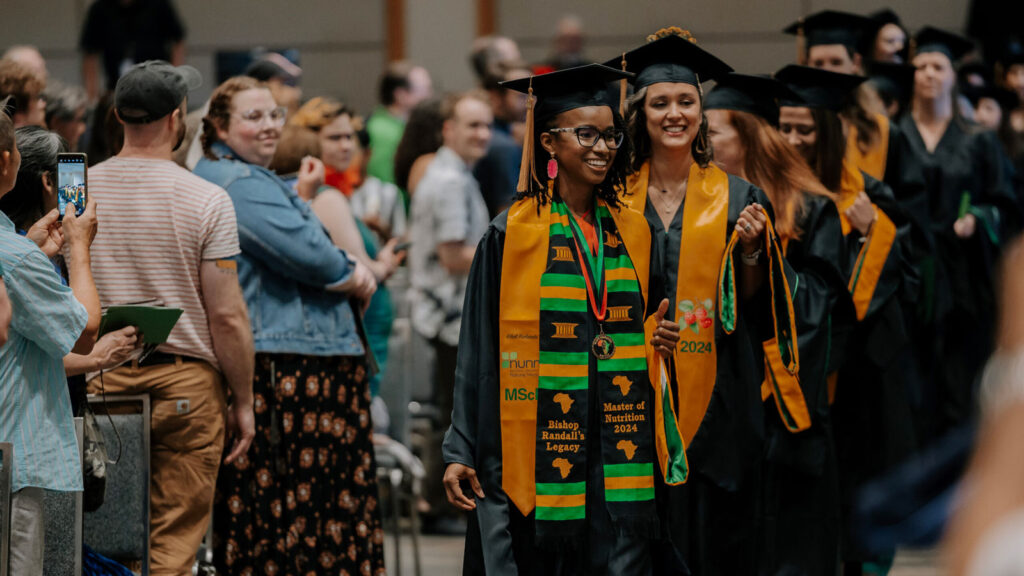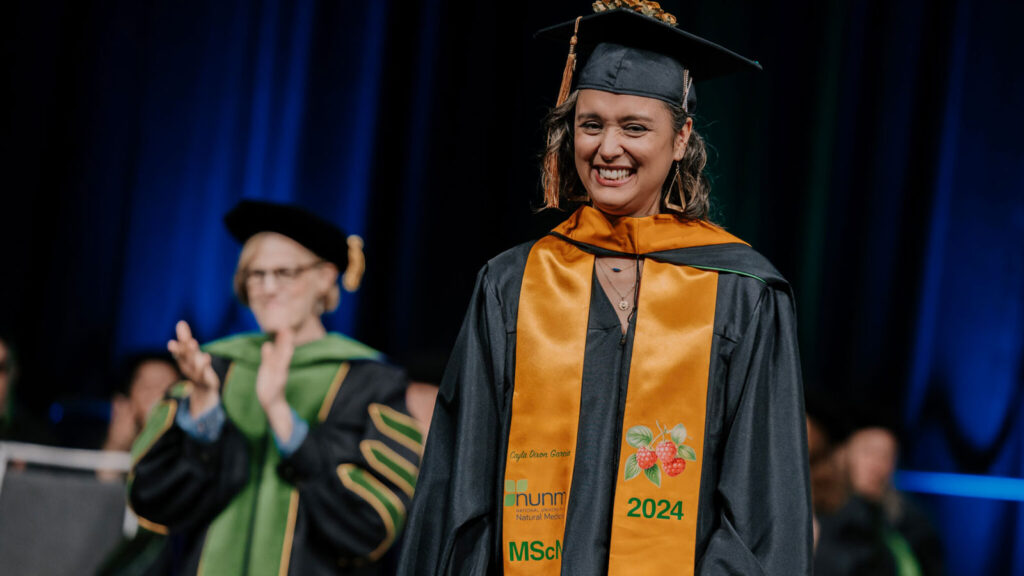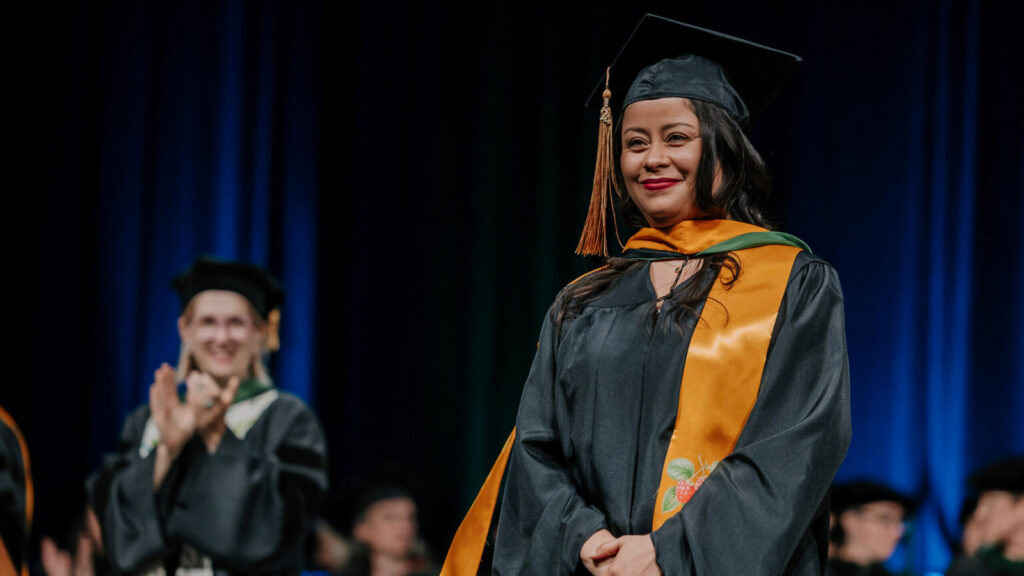Master of Science in Nutrition alumni chose flexible virtual learning to follow their passion and improve personal and community health outcomes.

After years of learning together in virtual classrooms, National University of Natural Medicine (NUNM) online students met in person for the first time to celebrate their graduation.
As online classmates, they chatted frequently into the late-night hours and often texted early in the morning to prepare for class, but they had only ever known each other through a screen.
Until June 29, when they traveled from all corners of the country to Portland, with their families in tow, to gather at the Oregon Convention Center for NUNM’s commencement ceremony.
Finally together in the same city, the graduates in their caps and gowns posed for photos as their classmates filled the room one by one alongside faculty members and staff.
“I feel like I know all of them, but today I’m officially meeting them—it’s really nice”, said 2024 MScN alumna Leticia Anaya, recognizing another familiar face in the crowd.
The once long-distance classmates exchanged embraces, shared stories from commencement week, and recounted memories from the last two years of online learning in the Master of Science in Nutrition (MScN) program.
A Little Community
Cayla Dixon Garcia, a 2024 MScN alumna from Louisiana, worked part-time and homeschooled four children throughout the program.
She struggled to contain her excitement with every new person who walked through the doors, sharing in an overwhelming energy that caused many of them to try and hold back tears.
“That kind of daily interaction—just chatting and checking in with each other—we had built that little community,” she said, “so even though it was virtual, it was really meaningful.”
She smiled when she saw another classmate Ethel Kibibbi-Akua Richards, who arrived from Georgia, launch in to hug other faculty members.
“That kind of daily interaction—just chatting and checking in with each other—we had built that little community, so even though it was virtual, it was really meaningful.”
— Cayla Dixon Garcia ’24
Richards restrained an enthusiastic scream when she reflected on the importance of the day, describing the event as a “full circle moment” for her.
She said the program only further stressed the importance of community and entrepreneurship—something her grandfather had worked hard to build decades earlier, as perhaps the first African American locksmith in the nation. He was also a staunch supporter of food justice, she said.

“He wanted to bring in fresh produce into the neighborhood to make sure that we had access to food, so he opened a fruit and vegetable stand,” she said. “I found all this out looking through his old briefcase and was like, ‘Oh my gosh, my life makes so much more sense now.”
Anaya had only recently got off a plane from Los Angeles for graduation, joined closely by proud family members.
“When I initially signed up for the program, I thought I would feel very distant from my professors or other students,” she said. “I felt a closeness I didn’t think I would feel.”
Bridging the Gap
Kira Freed, coordinator for the NUNM Nutrition program and an adjunct faculty member, said she also felt the “magic” in the air. Although she had never met her online students before, they all fell so easily into a natural rhythm as if they had known one another for years.
“We have the time, ability, and just genuine desire to get to know who our students are—especially when they’re online and need that sense of connection to this place.”
— Kira Freed
Freed said NUNM had always sought new ways to adapt its programming to better mirror trends in education and online study. The university took student feedback seriously to bridge the gap between its online and in-person student communities, she said.
“The nature of our program is that it’s small and we’re a small institution, and those smaller class sizes help create a sense of community,” Freed said. “We have the time, ability, and just genuine desire to get to know who our students are—especially when they’re online and need that sense of connection to this place.”
While the online program was asynchronous and students had ongoing access to complete lessons, she said, they also had other options to get engaged virtually in office hours, group discussions, and livestreamed classes as they occurred on campus.
Connected to Campus
Dixon Garcia had also become involved in the Student Government Association during the program, which allowed her to feel even more linked with the larger NUNM community.
“That really helped me feel connected in trying to fuse the online community with the on-campus community,” she said, “and to make sure our needs and voices were heard.”
Community is inherent to the nutrition program and a focal point of its curricula, said Freed, and this was reinforced through her Cultural Humility and Food Justice class, as well as regular advising sessions with students to explore internships and capstone projects.
Through the Food as Medicine Everyday (FAME) program, all three graduating MScN students chose to also receive training as educators and nutrition ambassadors within their local communities. This opportunity allowed them to extend their knowledge to a broader population and further promote principles of “food as medicine” outside the academic setting.
FAME, which first grew out of research conducted by the university on childhood obesity, served as a foundational element of the nutrition program.

At the Helfgott Research Institute, NUNM’s integrative medicine research hub and home base for nutrition programs, students were also taught how to cook within a robust teaching kitchen.
Online students followed on-campus culinary activities, bringing the teaching kitchen directly back into their homes. This allowed them to reframe food through a natural medicine lens, and design recipes with ingredients to help curb disease and maintain health.
“It’s important to acknowledge that food is not the only medicine,” Freed said, adding that physical movement, laughter, and community itself can also be forms of medicine that improve quality of life.
“This is an important part of the naturopathic philosophy—we are embracing all the tools that are available to us and taking a much broader, more holistic approach.”
Richards said the availability of all these tools is what attracted her to NUNM’s online program in the first place.
Passion for Food and Cooking
As the founder of iEatMorePlants, Richards had already been working as a healthcare consultant in Atlanta when she decided to get her nutrition degree at NUNM.
“Now, I can go into just about any community, any faith group, talk to you in a way that you understand and fire you up about eating more plants,” she said. “That’s what it’s really about.”
As a “naturopathically trained, clinical community nutritionist”, Richards said she had a renewed approach to patient care using a whole-person framework to encourage healthy eating habits, lifestyle, and attitudes around food.
“I think we’ve all had some sort of firsthand experience in seeing the power of food as medicine.”
— Kira Freed
Yet, she still believes nutrition is an undervalued profession—sometimes within the medical profession itself.
“We are heavily trained, clinically trained just like a nurse, even taking some of the same core courses found in medical schools, but we use food as medicine,” Richards said. “Look at what the hospitals are feeding you when you’re sick? That’s not healing food.”
Freed said students are driven to the nutrition program through their evolving passion for food and cooking, but many also come to NUNM after critical life experiences.
“I think we’ve all had some sort of firsthand experience in seeing the power of food as medicine,” said Freed, whose own father was diagnosed with colon cancer, forcing her to look closer at nutrition to help him make lifestyle changes. “Seeing how it directly has impacted either our own personal health journey or that of someone very close to us.”
Anaya said she had always been interested in cooking and food, but it was only until her mother passed away from stomach cancer that she committed to exploring nutrition as a resource to prevent illness.
She was attracted to the program by its inclusive language, with themes like “whole foods” and “not just one diet for everyone”.

Plans for the Future
“In my community, the Latino community, Type 2 Diabetes and cancer are so prevalent that we are seeking more answers,” said Anaya.
“It felt like something I wanted to do for my community to bring back some knowledge and more of a holistic approach to nutrition.”
In the coming years, Anaya plans to obtain her Certified Nutrition Specialist credential and begin her internship for clinical work.
Like Dixon Garcia, she also plans to run future FAME workshops within her own community in Southern California, as well as focus on the Your Nutrition Amiga business she started during her program capstone project.
“It felt like something I wanted to do for my community to bring back some knowledge and more of a holistic approach to nutrition.”
— Leticia E. Anaya ’24
Richards also plans to change the mentality around nutrition by hosting FAME community workshops back home, as well as within her medical nutrition therapy career.
While there is not one single path for those interested in studying nutrition, Freed said that choosing online learning at NUNM can be a unique opportunity for students. It allows them to study at their own pace, while continuing to accomplish other goals such as work, family, or ongoing leadership initiatives within their local community.
“It’s like any graduate education opportunity—it is what you make of it,” she said. “There are opportunities to go as deep and engage as much as you would like, and the more you put into this experience, the more you’re going to get out of it.”
by Ashley Villarreal, Marketing Content Specialist